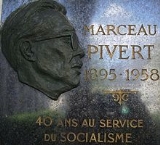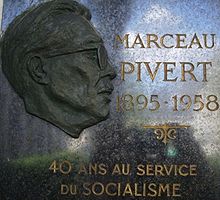
Marceau Pivert
Encyclopedia

France
The French Republic , The French Republic , The French Republic , (commonly known as France , is a unitary semi-presidential republic in Western Europe with several overseas territories and islands located on other continents and in the Indian, Pacific, and Atlantic oceans. Metropolitan France...
schoolteacher, trade union
Trade union
A trade union, trades union or labor union is an organization of workers that have banded together to achieve common goals such as better working conditions. The trade union, through its leadership, bargains with the employer on behalf of union members and negotiates labour contracts with...
ist, Socialist
Socialism
Socialism is an economic system characterized by social ownership of the means of production and cooperative management of the economy; or a political philosophy advocating such a system. "Social ownership" may refer to any one of, or a combination of, the following: cooperative enterprises,...
militant and journalist. He was an alumnus of the École normale supérieure de Saint-Cloud.
In the Socialist Party
Active in the Syndicat National des Instituteurs (SNI), a staunch supporter of laïcitéLaïcité
French secularism, in French, laïcité is a concept denoting the absence of religious involvement in government affairs as well as absence of government involvement in religious affairs. French secularism has a long history but the current regime is based on the 1905 French law on the Separation of...
and a pacifist
Pacifism
Pacifism is the opposition to war and violence. The term "pacifism" was coined by the French peace campaignerÉmile Arnaud and adopted by other peace activists at the tenth Universal Peace Congress inGlasgow in 1901.- Definition :...
after service in World War I
World War I
World War I , which was predominantly called the World War or the Great War from its occurrence until 1939, and the First World War or World War I thereafter, was a major war centred in Europe that began on 28 July 1914 and lasted until 11 November 1918...
, Pivert joined the Socialist Party
Socialist Party (France)
The Socialist Party is a social-democratic political party in France and the largest party of the French centre-left. It is one of the two major contemporary political parties in France, along with the center-right Union for a Popular Movement...
(PS) and then the French section of the Workers' International (SFIO) wing under Léon Blum
Léon Blum
André Léon Blum was a French politician, usually identified with the moderate left, and three times the Prime Minister of France.-First political experiences:...
(the section of the Party that had refused in 1920 adherence to the Comintern
Comintern
The Communist International, abbreviated as Comintern, also known as the Third International, was an international communist organization initiated in Moscow during March 1919...
, as opposed to the new French Communist Party
French Communist Party
The French Communist Party is a political party in France which advocates the principles of communism.Although its electoral support has declined in recent decades, the PCF retains a large membership, behind only that of the Union for a Popular Movement , and considerable influence in French...
, PCF).
In the early 1930s, Pivert grouped the most left-wing members of the SFIO in his Gauche Révolutionnaire ("Revolutionary Left") tendency, to which Daniel Guérin
Daniel Guérin
Daniel Guérin was a French libertarian and author, best known for his work Anarchism: From Theory to Practice, as well as his collection No Gods No Masters: An Anthology of Anarchism in which he collected writings on the idea and movement it inspired, from the first writings of Max Stirner in the...
was a member, one which opened itself to Trotskyism
Trotskyism
Trotskyism is the theory of Marxism as advocated by Leon Trotsky. Trotsky considered himself an orthodox Marxist and Bolshevik-Leninist, arguing for the establishment of a vanguard party of the working-class...
, initiating entryism
Entryism
Entryism is a political tactic by which an organisation or state encourages its members or agents to infiltrate another organisation in an attempt to gain recruits, or take over entirely...
as a tactic for the latter.
In 1936, when Blum formed the Popular Front
Popular Front (France)
The Popular Front was an alliance of left-wing movements, including the French Communist Party , the French Section of the Workers' International and the Radical and Socialist Party, during the interwar period...
government, he was pressured by Pivert to reject Capitalism
Capitalism
Capitalism is an economic system that became dominant in the Western world following the demise of feudalism. There is no consensus on the precise definition nor on how the term should be used as a historical category...
. Witness to the spontaneous strikes
Strike action
Strike action, also called labour strike, on strike, greve , or simply strike, is a work stoppage caused by the mass refusal of employees to work. A strike usually takes place in response to employee grievances. Strikes became important during the industrial revolution, when mass labour became...
around the country, Blum refused to allow for revolutionary conditions to arise. Pivert then wrote his best-known article, published on 27 May, headlined Tout est possible! ("Everything Is Possible"), alluding to a social revolution
Social revolution
The term social revolution may have different connotations depending on the speaker.In the Trotskyist movement, the term "social revolution" refers to an upheaval in which existing property relations are smashed...
(although never to a socialist one). However, he was contradicted by the communist press organ L'Humanité
L'Humanité
L'Humanité , formerly the daily newspaper linked to the French Communist Party , was founded in 1904 by Jean Jaurès, a leader of the French Section of the Workers' International...
(the PCF was a backer of the Blum government). The communist editorial read: Non! Tout n'est pas possible! ("No! Not Everything Is Possible!"). In consequence, Pivert cut off links with the government, writing to Blum that "I will not accept capitulation in front of Capitalism and the banks".
Leader of the PSOP
The Gauche Révolutionnaire left the SFIO to establish the Workers and Peasants' Socialist PartyWorkers and Peasants' Socialist Party
The Workers and Peasants' Socialist Party was an ephemeral socialist organisation in France, formed on June 8, 1938 by Marceau Pivert...
(Parti Socialiste Ouvrier et Paysan, PSOP), which had a hard time finding a place in-between the Socialists and the Stalinists
Stalinism
Stalinism refers to the ideology that Joseph Stalin conceived and implemented in the Soviet Union, and is generally considered a branch of Marxist–Leninist ideology but considered by some historians to be a significant deviation from this philosophy...
. In fact, its ideology fluctuated from Marxist
Marxism
Marxism is an economic and sociopolitical worldview and method of socioeconomic inquiry that centers upon a materialist interpretation of history, a dialectical view of social change, and an analysis and critique of the development of capitalism. Marxism was pioneered in the early to mid 19th...
orthodoxy to a radical version of Reformism
Reformism
Reformism is the belief that gradual democratic changes in a society can ultimately change a society's fundamental economic relations and political structures...
. The PSOP was part of the International Revolutionary Marxist Centre
International Revolutionary Marxist Centre
The International Revolutionary Marxist Centre was an international association of left-socialist parties. The member-parties rejected both mainstream social democracy and the Third International.-Organizational history:...
. In 1940, the PSOP was outlawed after the fall of France to Nazi Germany
Nazi Germany
Nazi Germany , also known as the Third Reich , but officially called German Reich from 1933 to 1943 and Greater German Reich from 26 June 1943 onward, is the name commonly used to refer to the state of Germany from 1933 to 1945, when it was a totalitarian dictatorship ruled by...
, through the orders of Vichy government
Vichy France
Vichy France, Vichy Regime, or Vichy Government, are common terms used to describe the government of France that collaborated with the Axis powers from July 1940 to August 1944. This government succeeded the Third Republic and preceded the Provisional Government of the French Republic...
leader Philippe Pétain
Philippe Pétain
Henri Philippe Benoni Omer Joseph Pétain , generally known as Philippe Pétain or Marshal Pétain , was a French general who reached the distinction of Marshal of France, and was later Chief of State of Vichy France , from 1940 to 1944...
.
Pivert exiled himself to Mexico
Mexico
The United Mexican States , commonly known as Mexico , is a federal constitutional republic in North America. It is bordered on the north by the United States; on the south and west by the Pacific Ocean; on the southeast by Guatemala, Belize, and the Caribbean Sea; and on the east by the Gulf of...
, and supported the French Resistance
French Resistance
The French Resistance is the name used to denote the collection of French resistance movements that fought against the Nazi German occupation of France and against the collaborationist Vichy régime during World War II...
. Returned to France after World War II
World War II
World War II, or the Second World War , was a global conflict lasting from 1939 to 1945, involving most of the world's nations—including all of the great powers—eventually forming two opposing military alliances: the Allies and the Axis...
, he saw the PSOP divided between the wing that joined the PCF (which had acquired prestige after its active contribution to the Resistance), and the one that joined the SFIO - he himself opted for the latter.
He became more moderate inside the SFIO, and his audience was curtailed. Pivert was regularly elected to the party leadership, but nonetheless stood for Algeria
Algeria
Algeria , officially the People's Democratic Republic of Algeria , also formally referred to as the Democratic and Popular Republic of Algeria, is a country in the Maghreb region of Northwest Africa with Algiers as its capital.In terms of land area, it is the largest country in Africa and the Arab...
's independence and was hostile to the creation of a European Defence Community
European Defence Community
The European Defense Community was a plan proposed in 1950 by René Pleven, the French President of the Council , in response to the American call for the rearmament of West Germany...
(contrary to the party line). He antagonized the SFIO further after taking part in a delegation that visited the Soviet Union
Soviet Union
The Soviet Union , officially the Union of Soviet Socialist Republics , was a constitutionally socialist state that existed in Eurasia between 1922 and 1991....
, and was voted out of his central position. According to some, Pivert had projected joining the new Parti Socialiste Autonome (PSA) created by Édouard Depreux
Édouard Depreux
Édouard Depreux was a French socialist journalist, essayist, and politician of the French Fourth Republic; he was born in Viesly and died in Paris.- Early career :...
and Alain Savary
Alain Savary
Alain Savary was a French Socialist politician, deputy to the National Assembly of France during the Fourth and Fifth Republic, chairman of the Socialist Party and a government minister in the 1950s and in 1981, when he was nominated by President François Mitterrand as Minister of National...
, but died before being able to carry out the merger. However, most of his followers in the SFIO entered the PSA later in 1958.
External links
- (en) Marceau Pivert Archive on the Marxists Internet Archive
- (fr) Pivert on La Bataille Socialiste

